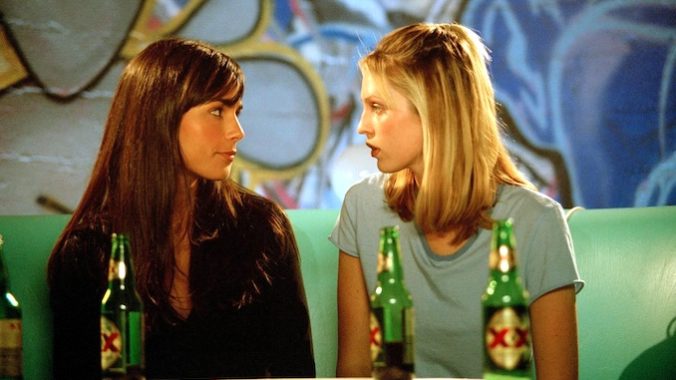20 Years On, D.E.B.S.‘ Campy Lesbian Romance Is Still a Delight to Behold

We conduct a nationwide manhunt for you and you’re boning the suspect? Did you think this was a joke? “Let’s direct federal resources and man hours so I can have my collegiate lesbian fling in style!”
When D.E.B.S. premiered at Sundance Film Festival 20 years ago, the film received a mixed reception. Lauded for its campy comedic beats by some and skewered for its unseriousness by others, director Angela Robinson’s first feature film was relatively misunderstood at the time, but has since been reclaimed as one of queer cinema’s greatest masterpieces. A spiritual sibling to last year’s off-beat hit Bottoms and sharing the same early-2000s je ne sais quoi as Bring It On, D.E.B.S. is a campy, queer triumph, poking fun at genre conventions and maintaining its tongue-in-cheek, self-aware energy to deliver a lesbian rom-com-spy-romp mashup that remains unmatched by queer cinema to this day.
The film follows Amy Bradshaw (Sara Foster), a superspy within the D.E.B.S. (Discipline, Energy, Beauty, Strength) organization, whose agents work alongside Homeland Security, the National Guard, and every other relevant international security force to protect the U.S. from threats—all while decked out in tiny plaid skirts, button-up shirts, and a tie to match. Amy and her teammates—hotheaded leader Max (Meagan Good), unaffected Dominique (Devon Aoki) and naïve Janet (Jill Ritchie)—were chosen using a secret test within the SAT that measures spy aptitude, with Amy herself achieving a perfect score, and her team’s effectiveness in the field is only elevated by her star status. But when Amy comes face to face with international supervillainess Lucy Diamond (Jordana Brewster), she begins to rethink her future as her charming enemy opens her world beyond the confines of stifling spyfare.
Featuring questionable greenscreen and a classically 2000s soundtrack, D.E.B.S. is deeply unserious and astronomically stupid, riffing on a specific type of brainless genre flick with a clear and undeniable affection. While it may have been easy to fall into the same traps of the films its trying to satirize, this film never takes itself seriously, applying tropes from within the lesbian subgenre, the action genre, and the heteronormative rom-com to poke fun at the most repeated story conventions, all while simultaneously filling a gap within each genre as well. The effortless and hilarious crossover between its various moving parts allow it to remain unique and fresh, while offering twists on elements we’ve seen on screen over and over again.
Every stereotypical action sequence is undercut (read: enhanced) by the blunt comedy within D.E.B.S.; one of the very first scenes features an obligatory info-dump on Lucy, complete with holograms of newspaper clippings and “she’s the most dangerous woman in the world”-hyperbole—only for a waitress to walk right through their briefing screen because they’re doing this in the middle of the academy’s cafeteria…and they ordered breakfast. The world-threatening meeting between Lucy and a Russian assassin is actually just a blind date; Lucy and Amy’s first meet-cute involves them pointing guns in each others’ faces; the stereotypical action themes and beats are simply tools to bring Lucy and Amy together, and the contrast between their villainous and heroic lifestyles is used to ultimately subvert the stereotypical lesbian story beats the film utilizes.
-

-

-

-

-

-

-

-

-

-

-

-

-

-

-

-

-

-

-

-

-

-

-

-

-

-

-

-

-

-

-

-

-

-

-

-

-

-

-

-








































